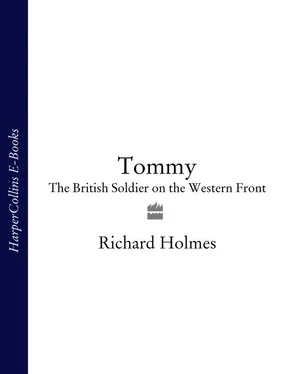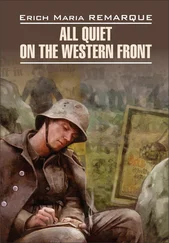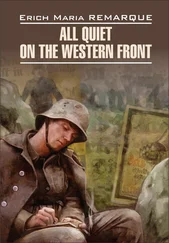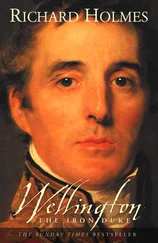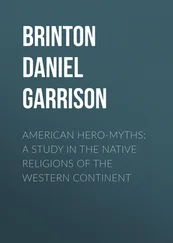Tommy
The British Soldier On The Western Front 1914–1918
Richard Holmes
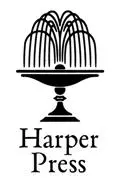
HarperPress
An imprint of HarperCollins Publishers Ltd. 1 London Bridge Street London SE1 9GF
www.harpercollins.co.uk
First published by HarperCollins Publishers 2004
Copyright © Richard Holmes 2004
PS section copyright © Patrick Bishop 2005
PS™ is a trademark of HarperCollins Publishers Ltd
Richard Holmes asserts the moral right to be identified as the author of this work
A catalogue record for this book is available from the British Library
All rights reserved under International and Pan-American Copyright Conventions. By payment of the required fees, you have been granted the non-exclusive, non-transferable right to access and read the text of this ebook on-screen. No part of this text may be reproduced, transmitted, down-loaded, decompiled, reverse engineered, or stored in or introduced into any information storage and retrieval system, in any form or by any means, whether electronic or mechanical, now known or hereinafter invented, without the express written permission of HarperCollins ebooks
Ebook Edition © SEPTEMBER 2010 ISBN: 9780007383481
Version date: 2018-07-18
Some images were unavailable for the electronic edition.
For Lizzie, with love and admiration
Cover
Title Page
COPYRIGHT
DEDICATION
INTRODUCTION
PROLOGUE: TOMMY ATKINS
I
ZERO HOUR
SWITZERLAND TO THE SEA
THE EBB AND FLOW OF BATTLE
II
ONE WAR, FOUR ARMIES
OLD WORLD, OLD ARMY
SATURDAY NIGHT SOLDIERS
NEW ARMY
III
CHAIN OF COMMAND
ONE LONG LOAF?
IV
A VIEW FROM THE PARAPET
FIGURES IN A LANDSCAPE
BASE DETAILS
V
A MILITARY REVOLUTION
BROTHER LEAD AND SISTER STEEL
THE BOLD BOMBARDIER
THE DEVIL’S BREATH
BRAZEN CHARIOTS
SWORD AND PISTOL
WITH THE RANK AND PAY OF A SAPPER
WOEFUL CRIMSON
VI
THE WILL OF AN ARMY
MAN AND GOD
FRIEND AND FOE
MORALE AND DISCIPLINE
ENVOI
REFERENCES
BIBLIOGRAPHY
ABBREVIATIONS AND GLOSSARY
ACKNOWLEDGEMENTS
INDEX
P. S.
ABOUT THE AUTHOR
INTERVIEW
READ ON
PRAISE
ALSO BY RICHARD HOLMES
ABOUT THE PUBLISHER
Contemporaries instinctively called it Great: La Grande Guerre, Weltkrieg, and we can easily see why. Of course it was not the largest single event of world history: that ghastly honour must go to the Second World War, which in terms of human suffering and material destruction was infinitely worse for the world as a whole. But for Britain alone the First World War caused more casualties, which partly accounts for the fact that it is remembered in a particular way here. Many who lived through both conflicts agreed with Harold Macmillan and J. B. Priestley that the First World War was a more significant watershed than the Second. Barbara Tuchman may have been the first to use the analogy of 1914–18 as an iron gate separating the present from the past, and it has proved to be an enduring and powerful image ever since.
So there it lies, overgrown, like the trenches that still lace the landscape of Northern France, but somehow dug deep into our consciousness. And it usually enters our minds not as history, but as literature. One of the problems with trying to write about the First World War is that most people have already read Wilfred Owen and Siegfried Sassoon, Pat Barker and Sebastian Faulks before you get to them. I am certainly not the first historian to complain that it was far too literary a war. Cyril Falls began the process even before the Second World War; Correlli Barnett continued the movement thirty years ago and only last year, Brian Bond’s important book The Unquiet Western Front fired yet another well-aimed burst into an enemy who shows little sign of falling, but lurches on, stick grenades in hand, intent on doing yet more mischief to our understanding. Professor Bond suggests that ‘the “real” historical war abruptly ceased to exist in November 1918’. 1What followed was the resurrection and reworking of the war largely in terms of novels, memoirs and war literature in general. Indeed, Paul Fussell, in his influential book The Great War and Modern Memory, maintained that the war was uniquely awful and as such lay ‘outside history’, explicable primarily through its literature.
This process has not simply affected the way we think of history: it strikes a resonance through the present and on into the future. Omer Bartov described what he termed ‘the invention of memory’ when he considered the effect of war literature in both France and Germany. ‘Experience of loss and trauma extends beyond personal recollection,’ he argued, ‘and comes to encompass both individual and collective expectations of the future.’ 2It seems to me that Bartov has identified a key element of the process. By studying the war as literature we do not simply colour our view of the past and make it all but impossible to teach the war as history. We go on to tint our picture of the present and our image of the future too. When Second World War soldiers wanted to describe something going particularly badly they spoke of ‘The biggest balls-up since the Somme.’ For years it was impossible to attend a military presentation without a clip of Blackadder Goes Forth discussing the strategic imperative of inching Field Marshal Haig’s drinks cabinet closer to Berlin, and in the first Gulf War British camps in the desert were named after Captain Blackadder and his cronies.
No sooner had its last shot echoed away than some participants recognised that the war they knew was being hijacked. Charles Carrington, who won his Military Cross as an infantry officer at Passchendaele, complained:
It appeared that dirt about the war was in demand … Every battle a defeat, every officer a nincompoop, every soldier a coward. 3
Cyril Falls, a veteran turned Oxford don, saw how:
Every sector became a bad one, every working party is shot to pieces; if a man is killed or wounded his entrails always protrude from his body; no one ever seems to have a rest … Attacks succeed one another with lightning rapidity. The soldier is represented as a depressed and mournful spectre helplessly wandering about until death brought his miseries to an end. 4
In practice it was not that simple, for many of the men writing in the 1920s and 1930s – Robert Graves and R. C. Sherriff amongst them – were actually ambiguous about the war, and actively resented being termed ‘anti-war authors’.
Ambiguity became less marked as the war receded. Oddly enough, this happened at precisely that moment when, had the war been considered primarily as history, the appearance of a wide range of new sources, not least the first of the official histories, might have been expected to have broadened understanding. Erich Maria Remarque’s All Quiet on the Western Front, first published in 1929 and made into a film the following year, was an important milestone. Remarque’s own experience of the war was very limited. He never actually fought in the trenches, was slightly wounded by shrapnel, and after the war was censured for posing as a decorated officer. The undaunted Charles Carrington was infinitely more experienced, and was indeed what Remarque pretended to be. But All Quiet struck a powerful chord with many veterans looking back at the war from the deep disillusionment of the late 1920s, and in a sense more accurately reflects the state of its author and his friends in 1929 than the condition of the German army twelve years before.
Читать дальше
